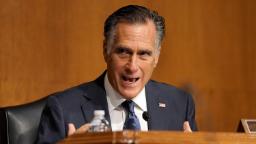
(CNN)A decade ago, Mitt Romney went on CNN and made a statement that was widely perceived as a major mistake.
“Russia, this is, without question, our number one geopolitical foe,” Romney, who would be the Republican presidential nominee in the 2012 race against President Barack Obama, told Wolf Blitzer in March of that year. “They — they fight every cause for the world’s worst actors.”
Obama and his team pounced on the comment, insisting that it showed Romney was hopelessly out of touch when it came to the threats facing the US.
In the third presidential debate between the two candidates in October 2012, Obama went directly after Romney for that remark. “When you were asked, ‘What’s the biggest geopolitical threat facing America,’ you said ‘Russia.’ Not al Qaeda; you said Russia,” Obama said. “And, the 1980s are now calling to ask for their foreign policy back, because the Cold War’s been over for 20 years.”
The 80s called! Boom! Roasted!
At the time, the attack worked. Obama cast himself as the candidate who understood the current threats — led by al Qaeda. Romney was the candidate still stuck in the Cold War age, a black-and-white figure in a colorful — and complex — world.
But today, after Russian President Vladimir Putin ordered Russian troops into eastern Ukraine, Romney’s comments look very, very different. And by “different,” I mean “right,” as even some Democrats are now acknowledging.
“This action by Putin further confirms that Mitt Romney was right when he called Russia the number one geopolitical foe,” California Democratic Rep. Ted Lieu said on CNN Monday night.
Given that, it’s worth revisiting the context around what Romney said and why.
He was reacting to a hot-mic moment between Obama and then-Russian President Dmitry Medvedev earlier in 2012. In that exchange, Obama told Medvedev: “This is my last election. And after my election, I have more flexibility.”
Republicans were up in arms, insisting that Obama was taking a hard line with Russia publicly while, apparently, making clear to the country’s leader that he was open to compromise.
In his original interview, Blitzer was asking Romney about Russia in the context of that Obama hot-mic moment. And while his comment about Russia as America’s “number one geopolitical foe” is what drew the most attention and derision, it was far from the only comment Romney made about that subject in his interview with Blitzer.
“Russia is not a friendly character on the world stage,” Romney said at one point. “And for this President to be looking for greater flexibility, where he doesn’t have to answer to the American people in his relations with Russia, is very, very troubling, very alarming.”
Pressed by Blitzer on his assertion about the threat posed by Russia, Romney added this:
“Well, I’m saying in terms of a geopolitical opponent, the nation that lines up with the world’s worst actors. Of course, the greatest threat that the world faces is a nuclear Iran. A nuclear North Korea is already troubling enough.
“But when these — these terrible actors pursue their course in the world and we go to the United Nations looking for ways to stop them, when — when Assad, for instance, is murdering his own people, we go — we go to the United Nations, and who is it that always stands up for the world’s worst actors?
“It is always Russia, typically with China alongside.”
What looked like a major flub during the 2012 campaign — and was used as a political cudgel by Obama — now looks very, very different. It should serve as a reminder that history is not written in the moment — and that what something looks like in that moment is not a guarantee of what it will always look like.
Add Comment